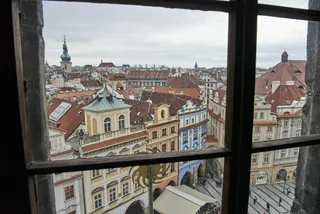With inflation in Czechia at a 30-year high (14.2 percent in April), a severe cost-of-living increase is already obvious, especially in the housing market.
As high inflation often translates to high anxiety and stress, many people feel the urge to secure for long-term one of their basic needs – a home.
Lower-income households will be hardest hit by inflation as they spend a greater share of their income on energy, food, and housing. Lower incomes are also more common among younger age groups, who on average earn less than their older, more experienced colleagues.
Fearing that the situation might get even worse, young people may be tempted to rush into getting a mortgage and buying a house.
But as a young person in the Czech Republic, getting a real estate loan is not a simple undertaking.
Only fourteen percent of young people can now afford a mortgage, suggests a survey reported by ČT24. For the quarter that does get approved the property often does not match their expectations.
Although some banks already take into account the age of mortgage applicants and slightly reduce interest rates, almost thirty percent of young people now prefer to delay buying real estate.
- The ideal monthly mortgage repayment for a third of people up to 36 years of age surveyed was ten thousand crowns. Twenty percent of young people could pay a monthly mortgage above CZK 15,000.
- For all mortgages – whether for a foreigner or Czech citizen – financial standing is key. Monthly payment of installments should not exceed 50 percent of the net salary. The total value of loans should not exceed nine times the yearly net salary.
- A 10 percent down payment is a must, but 20 percent is recommended to have for lower interest rates and higher chances of approval.
Czechs took out mortgages in April at an average rate of 4.15 hundredths of a percent. At that time, the base rate set by the Czech National Bank was five percent. But it has since risen again to five and three-quarters percent. Along with it, so have mortgage interest rates.
The inflation-driven increase in interest rates is not over yet. Banks are making mortgages more expensive based on how the Czech National Bank sets base rates. According to the current CNB governor Jiří Rusnok, they should increase further in June and exceed six percent.
Not only mortgages are becoming more expensive but also real estate. Flats rose by 20.6 percent year on year, family houses by 19.6, percent, and land by 23.7 percent, which is the most in 11 years of publication of the Hypoteční banka’s HB Index.
Pre-approved mortgages are no longer enough for those who use the loan to build a family house. The materials cost three times what they did a year ago. People are taking out more loans, dipping into family savings, or, in extreme situations, selling an unfinished house.
In addition to inflation, Prague is already one of Europe’s most expensive cities for buying a house, so homeownership in the capital city is set to become even more unattainable for younger people.












 Reading time: 2 minutes
Reading time: 2 minutes 























